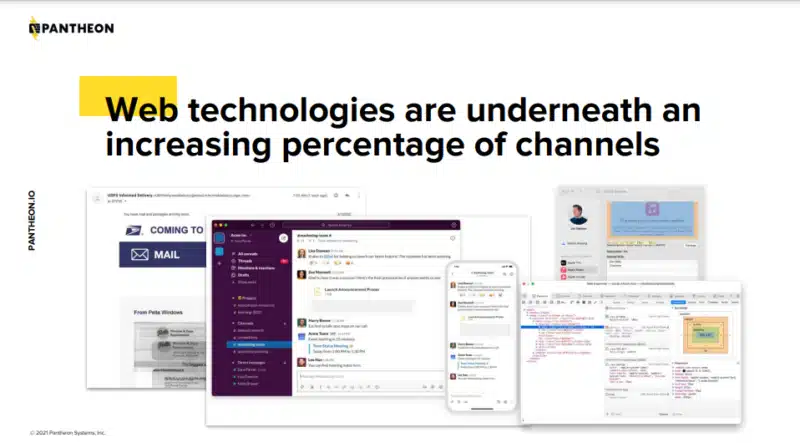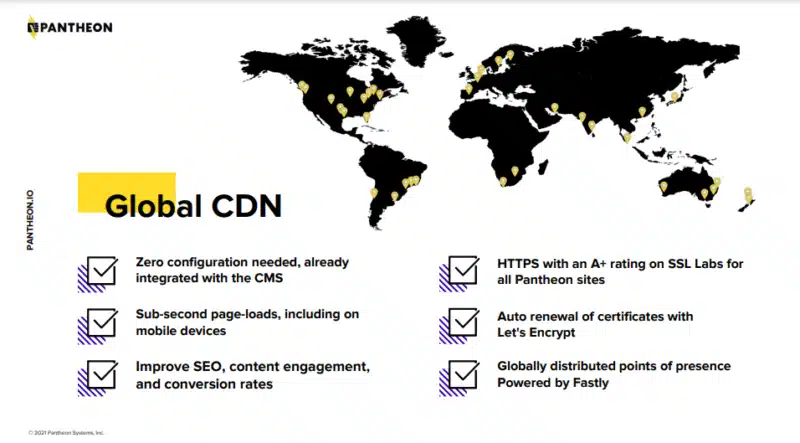Why WebOps is critical to digital marketing success
Your brand's marketing ops department isn't complete without WebOps.
WebOps — a brand’s team of developers, designers, content editors, stakeholders and more — is often overlooked as a nonessential piece of marketing operations.
“By WebOps, I mean a set of practices that facilitates collaboration and automates processes to improve the productivity of the whole web team,” said Steve Persch, director of technical marketing at Pantheon, in his presentation at The MarTech Conference. “The result with WebOps can be cross-functional web teams empowered to deliver to develop, test and release website changes faster and more reliably.”
Websites and other digital systems are complicated, and a poorly functioning web system could prove disastrous for your marketing efforts. That’s why brands need a dedicated team to address issues as they arise and help build trust in their systems.
“A common problem is a corrosion of trust, and that can happen when there’s a lack of confidence,” said Persch. “There’s a lack of fluency, perhaps in the shared tools and processes that web teams are using.”
Websites are digital assets
“In addition to betting on the importance of cross-functional teams in the decades to come, we’re betting on the importance of websites,” Persch said. “We’re betting that websites and web technology will remain central to the success of practically every professional venture out there for the next decade and beyond.”
Persch believes websites have an incredible amount of staying power. The web is the foundation of so many technologies, especially those where it’s not immediately apparent. Channels like email and advertising networks, as well as work platforms, all run on the power of the web.
Brands that view these tools and technologies as valuable assets will more easily see the necessity of WebOps.

“If you’re looking out toward the next decade and wondering what skills your team needs to be developing, what channels you should be betting on,” Persch said, “I think that betting on the skills of the web is a safe bet.”
Teams need a distinct WebOps team
Many brands believe they can get by with a DevOps team, relying solely on IT professionals and developers to navigate the digital landscape. But, these job roles are often too specialized for WebOps work.
“DevOps has done a whole lot to solidify the importance of this concept for the ecosystem of developers and the IT role or system operators,” said Persch. “One of the ways they have brought so much maturation and stability to the deep computer systems we rely on is because they have scoped themselves relatively narrowly to these two roles.”
“In the world of website operations, there are a lot more roles that need to be present in the conversation,” he added.
Some site issues are better suited for a WebOps team, especially when they directly affect marketing ROI. Here are some tasks a dedicated WebOps department can help brands address:
- Lowering a rising cost per lead (CPL) after implementing a new conversion rate optimization strategy.
- Restructuring CSS after a new template causes theme issues.
- Improving the content delivery network (CDN) speed after adding website assets.
WebOps helps marketers align goals
”I think if you have a cross-functional web team, the people on that team need to align their goals,” Persch said.
He recommends brands align goals cross-departmentally through CDNs. These systems have the potential to handle the large traffic spikes and ensure visitors experience a site that’s fast, engaging and secure.

However, it’s imperative that DevOps and WebOps teams set up their CDNs correctly. A poorly configured CDN can disrupt your cross-departmental operations, making it that much harder to align goals.
“We want web teams moving faster,” Persch said. “We want you moving so fast that you can get to the point of safely launching more than one thing at once, or where you can get to a point where you’re working on enough bits of work in progress that any element can get deployed as soon as the business needs it.”
He added, “It’s more important to have a website that can change tomorrow than it is to have a website that is exactly right today.”
Marketing work management: A snapshot
What it is: Marketing work management platforms help marketing leaders and their teams structure their day-to-day work to meet their goals on deadline and within budget constraints, all while managing resources and facilitating communication and collaboration. Functions may include task assignments, time tracking, budgeting, team communication and file sharing, among others.
Why it’s important today. Work environments have changed drastically due to the COVID-19 pandemic. This has heightened the need for work management tools that help marketers navigate these new workflows.
Marketers have been at work developing processes that allow them to work with those outside their own offices since marketing projects—campaigns, websites, white papers, or webinars—frequently involve working with outside sources.
Also, with marketers required to design interfaces, write content, and create engaging visual assets today, more marketers are adopting agile workflow practices, which often have features to support agile practices.
What the tools do. All of these changes have heightened the need for marketing work management software, which optimizes and documents the projects undertaken by digital marketers. They often integrate with other systems like digital asset management platforms and creative suites. But most importantly, these systems improve process clarity, transparency, and accountability, helping marketers keep work on track.
Opinions expressed in this article are those of the guest author and not necessarily MarTech. Staff authors are listed here.
Related stories